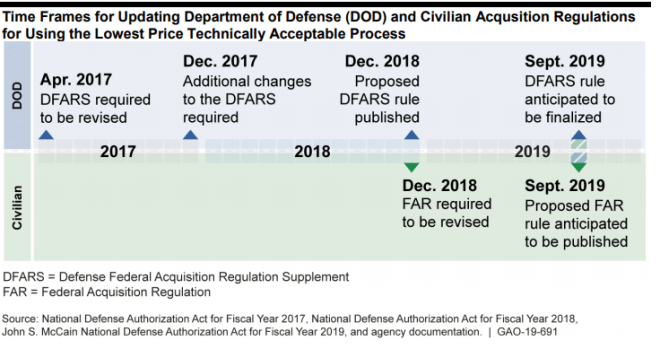The U.S. Defense Department will on September 26, 2019 publish a long-awaited final rule to implement Congress’ curbs on low-price awards. Unlike European governments, since World War II the U.S. government has come to rely heavily on multilateral competitive negotiations which trade off price and quality to ensure best value. Recent years, however, saw a resurgence of “lowest price technically acceptable” (LPTA) procurement – an award to the vendor that offers the cheapest good or service that is technically acceptable. The final rule, which reflects Congress’ concerns that the low-price method is used too often and inappropriately, may slow the use of LPTA awards.

Many have argued that the LPTA procurement method is a throwback to a more primitive form of procurement based on low price. Contracting officials, however, have embraced this return to low-price procurement. Critics have suggested that this is because low-price awards are easier to implement and explain, they reduce the nominal prices paid by the government, and awards based on low price allow contracting officials to avoid the often sticky questions raised by technical and past performance evaluations. Because price is simple and technical issues are often quite difficult for contracting officials to master, critics of the LPTA method have argued that focusing on low price reduces administrative costs and risks for contracting officials, even if the award does not result in the best value for users – a classic “agency” problem in procurement.
After long debate and numerous studies noting industry’s opposition to low-priced awards, Congress passed a series of laws intended to curb the use of the LPTA method in federal procurement. Despite early Pentagon guidance urging caution in the use of the LPTA method, Defense Department regulators took long (several years, though Congress had called for swift action) to prepare and publish a final rule implementing those statutory restrictions. Operational guidance for Defense Department contracting officials is being published as well, and civilian agency requirements will be addressed separately under a government-wide rule currently under review.

The final rule reflects a restrictive implementation of Congress’ curbs on low-price awards; in fact, the new rule is in many ways merely a “copy-and-paste” of the statutory requirements. Regulators repeatedly rejected suggestions to clarify, for example, that low-price awards should be limited to non-complex acquisitions. Regulators argued that where Congress did not impose a specific bar on low-price awards, further limitations should not appear in the rule – a markedly narrow approach, given the broad discretion allowed U.S. regulators when implementing legislation.
Despite regulators’ cautious approach, the final rule does impose important limitations on the use of the LPTA method:
- Contracting officials will have to document (but not necessarily publish) why they chose to use the LPTA method.
- Certain goods (such as personal protective equipment to be used in combat) are not to be purchased using the LPTA method.
- The LPTA method is to be avoided in contracts
and orders unless:
- Requirements can be described “clearly and comprehensively”
- Little value will be gained from a proposal that exceeds minimum technical requirements
- The technical requirements require little subjective assessment
- Review of the technical proposals is probably not valuable
- A different procurement method is unlikely to spur innovation
- The goods to be purchased are expendable or non-technical
- The contract file explains why the lowest price will reflect full life-cycle costs
Regulators’ comments to the final rule acknowledged that the government does not hold data on how often the LPTA method is actually used in practice. If, in response to this final rule, industry continues to press Congress for further limitations on low-price awards, future reforms may focus on the need for data on LPTA awards, and on greater transparency in contracting officials’ decisions to make awards based on low price.
Editor’s note: This post was updated on September 26, 2019 to include the two charts from GAO Report GAO-19-691, which was published after the final DFARS rule was released.












